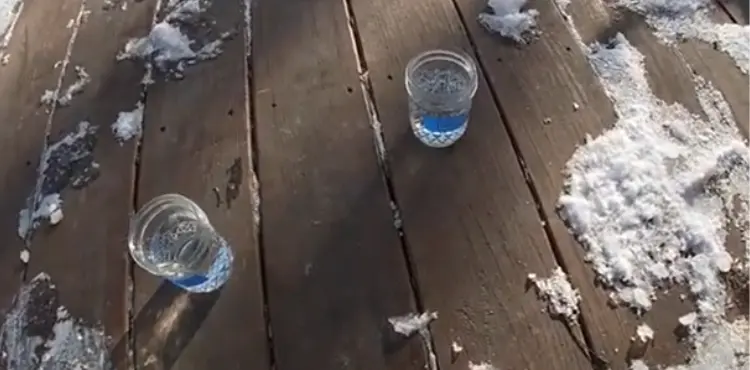Does hot water freeze faster than cold water MythBusters? Yes, hot water fish faster than cold water. In fact, there is an order of liquid that pieces faster to lower. The fastest liquid that freezes is hot water. After hot water, comes the cold water, vinegar, salt, water, sprite, and lastly syrup.
It seems impossible for hot water to freeze faster than cold water, right? Well, the effect occurs because hot water loses energy, has less mass, dissolves gas, evaporates, etc. Such conditions freeze hot water quickly.
There is more to discover about this concept. Keep reading!
Does Hot Water Freeze Faster Than Cold Water MythBusters?
If we say that hot water boils faster than cold water that would seem realistic. But what if we say hot water freezes faster than cold water? That will sound like a myth.
However many experiments have found that hot water can actually freeze more quickly than cold water. And of course, there are many scientific explanations behind it.
Mpemba Effect:
Well, the brief answer to the question is yes. Hot water freezes faster than cold water. And it occurs due to a unique effect known as the Mpemba effect.
Once a Tanzanian student noticed that hot ice cream froze faster than cold Ice cream. This Mpemba effect has been named after him. Moreover, many researchers have found that this phenomenon is actually true.
Compounds In Water:
Firstly, we have to know about the chemical compounds of water. We all know water is also called H20. It represents two atoms of hydrogen and one atom of oxygen. These atoms accumulate through electrons and form a covalent bond.
Hydrogen Bond:
You must have heard about hydrogen bonds. Well, it means the gathering of water molecules through intermolecular forces. The hydrogen bond occurs when a hydrogen atom comes closer to the oxygen atom in water.
Water Loses Energy:
Water molecules have the ability of natural repulsion which is actioned by the hydrogen bonds. This effect moves the covalent bonds apart to store energy.
On the other hand, the hydrogen bonds in the water stretch more when water is heated. This makes the covalent bond lose energy and shrink gradually. As a result, the water cools off. Since the energy of the hot water is no more, it freezes faster.
Weak Polar Of Hydrogen Bonds:
There is a weak polarity of hydrogen bonds in water molecules. This is like a loose network. When we boil water, that loose network of Polaris is destroyed. As a result, the disorder of water molecules increases and the energy of water molecules decreases.
Less Water Freeze Faster:
No doubt hot water evaporates and cold water does not. When the hot water evaporates, it loses some liquid from it.
So if you fill one glass with hot water and another glass with cold water in the same amount, the quantity will be less after some time. You will see the hot water is less than the cold water after it has evaporated enough. And if the quantity of water is less it will freeze faster.
Evaporation Cools Water:
Do you know that evaporation is a reason for prevailing a cooling effect? As said before, hot water evaporates, and cold water does not. Meanwhile, this evaporation causes a cooling effect.
So this effect is inevitable with hot water, not cold water. If the hot water gets cool faster then it will obviously freeze faster.
Convection Makes Hot Water Freeze Faster:
Another reason for hot water to freeze cold water is because of convection. Now what is convection? Well, it means the process occurring when the heat transfers within the water while moving. If you see, cold water does not have as much convection current as hot water.
One example of the convection current of water is water kept in a bucket. You must have seen that while bathing. When you fill your big bucket With warm water, it gets cooled within a few minutes. That is because the convection current is much higher. And that is responsible for cooling down hot water fast.
Low-Density Water Freezes Faster:
Usually, cold water is denser than hot water on both top and bottom. The reason is the loss of mass to evaporation for which no convection takes place. That’s why hot water is not as dense as cold water.
When you keep water in the freezer to freeze, its bottom part will freeze first. But we already know that the bottom part of cold water is denser than the bottom part of hot water.
Hence, the hot water will start freezing before the cold water from the bottom. After a time, you will see the hot water freezes completely but the cold water is still left to freeze completely.
Low Mass Water Freezes Faster:
We have discussed earlier that heating the water means destroying the loose network of weak polar in water molecules. But do you know that this heating process is responsible for losing the mass of water? The study says, that when water loses sufficient mass due to evaporation, it cools quickly and freezes quickly.
If you fill the ice cubes with water and keep them in the freezer, it will take 1 to 2 hours to freeze at 0° F. On the other hand, the Mpemba effect says, hot water takes 45 minutes to freeze
Frequently Asked Questions
Is the Mpemba effect real?
The Mpemba effect has not yet proven as a scientific phenomenon. However, many experiments found that the occurrence of the Mpemba effect is actually true.
Does hot water boil faster than cold water?
Water boils when it reaches the boiling point. Meanwhile, the cold water is far away from the boiling point compared to hot water. So yeah, hot water will boil faster than cold water.
Who discovered the Mpemba effect?
A schoolboy named Erasto Bartholomeo Mpemba discovered the Mpemba effect. He went through this paradoxical phenomenon where hot water freezes earlier than cold water.
Final Thoughts
A million-dollar question we all had is, Does hot water freeze faster than cold water MythBusters? Now we know that hot water actually freezes faster than cold.
It can be because of the lower density, lower mass, evaporation, or convection of the water. In addition, the Mpemba effect says that the loose network of polar bonds is no more in the hot boiled water. Whereas, cold water has that barrier for which it takes more time to freeze.
So this was all. Hopefully, you have now gained enough idea behind the reasons for hot water getting frozen more rapidly than cold water.

Hi, this is Sondip. In my opinion, the best approach to making the most of your home is to clean it, decorate it, and organize it. You should feel most at ease in your own home.
If you considering changing your faucets or wanting to repair the ones you already have could find my enthusiasm and my ideas to be of enormous help. My aim is to assist you in selecting the ideal faucet, and accessories for your residence and ensure that they are compatible with your sink and worktops.

